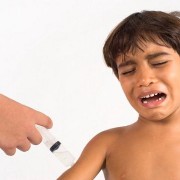 Photo: Getty Images
Photo: Getty Images
Doctors from the Cleveland Clinic Foundation and the Metro Hospital in Cleveland have found that children who have milk allergies may have an allergic reaction to DTaP containing vaccinations (diphtheria, acellular pertussis and tetanus).
The vaccine is cultured on casamino acids derived from cow’s milk that could cause anaphylactic shock in children who are allergic to milk products.
The doctors reviewed case notes of children receiving vaccines at their practice between September 2007 and March 2010 and found that seven children with an average age of 11 years had reactions to the vaccines. Six of the patients had a previous history of milk allergy and five of those had had severe allergic reactions to milk in the past. Four had reactions when they were exposed to only trace amounts of milk product and one was diagnosed with milk allergy via serologic testing.
All seven children had anaphylactic shock symptoms immediately after vaccination. Five had wheezing and urticaria (raised, bumpy rash), three had sneezing, nasal congestion and angioedema (a swelling of the deeper layers of skin) and two had repetitive cough. The children were treated with anti-histamines, epinephrine, inhaled beta-antagonists or corticosteroids.
An analysis was performed on two lots of DTaP vaccines and the presence of milk protein was found in one lot (30ng/mL).
The doctors concluded that "Vaccines containing tetanus, diphtheria, and acellular pertussis derived from broths containing casamino acids may present a risk to persons with severe milk allergy."
The children in this review all had elevated specific IgE antibodies to milk proteins within two years of their reaction to vaccination. It may be that some milk allergies are triggered by vaccination. When the milk proteins are injected, the body mounts an antibody response in the same way it does to vaccine viruses so that when the child is next in contact with milk proteins, the immune system reacts. The first DTaP is given at two months of age, before the child is old enough for solid foods. This could pre-dispose him to having future dairy allergies when he is older.
Vaccines can also contain arachis hypogaea L (groundnut oil) as an adjuvant--a substance that causes you to make more antibodies. The University of Benin in Nigeria, studied measles vaccine made with groundnut oil and noted that "Haemagglutination inhibition (HAI), geometric mean titre (GMT) and lymphocyte transformation test (LTT) were measured following inoculation of Erythrocebus patas with inactivated measles vaccine (IMV) and oils of Arachis hypogaea L (GO), Cocos nucifera L (CO), Freund's complete and incomplete adjuvants (FCA, FIA). The study suggests that the oils under investigation, particularly the GO oil should be considered as an adjuvant with IMV after extensive study in humans."
Vaccine patents suggested peanut oil as a possible adjuvant: "Any metabolizable oil, particularly from an animal, a fish a vegetable source may be used herein.
Sources for vegetable oils include nuts, seeds and grains. Peanut oil, soybean oil, coconut oil, and olive oil, the most commonly available, exemplify the nut oils."
Unlike with food, the ingredients of medicines aren’t required to be listed and indeed, some of them are withheld due to trade secrets. If all the adjuvants and other ingredients in vaccinations were known, then other vaccine companies could simply copy the formula.
David Stout, President of GlaxoSmithKline’s Worldwide Pharmaceuticals, said that adjuvants for vaccines are a trade secret, but confirmed that products containing that same ingredient had been used on consumers before. If nut oil is in any of the childhood vaccines, it does not have to say so in the patient information sheet and the doctor administering it may not even be aware.
Exposure to nut oils via vaccination during early infancy could potentially be a reason for the increase in nut allergic children.
Similarly, one fourth of children who have had a bad reaction to MMR vaccination have often been found to be allergic to gelatine, an animal bone product used in vaccine. In the study of MMR-allergic children, the authors wrote, "Of 22 study subjects, 6 (27%) tested positive for anti-gelatin IgE, whereas none of the 27 controls did."
Gelatine is in many foods including cookies, cakes, Jell-o, and children’s sweets and is a gelling agent. It is also found in medicine capsules and even in cosmetics so life could be problematic for a child who is gelatine-allergic. If the gelatine allergy is triggered by injection of gelatine, then drug makers should consider removing it from their products. When Japan switched from DPT vaccine to a DtaP version that didn’t contain gelatine, incidences of gelatine specific hypersensitivity reactions decreased dramatically.
The doctors in the MMR/gelatine review suggested that allergic children should seek an allergy evaluation before undergoing vaccination and parents with sensitive children should exercise caution and look at all available options before embarking on future vaccinations.
Sources:
The Journal of Allergy and Clinical Immunology
Volume 127, Issue 2, Supplement , Page AB238, February 2011 - http://www.jacionline.org/article/S0091-6749(10)02887-3/fulltext
Vaccine. 1996 Dec;14(17-18):1703-6 - http://www.ncbi.nlm.nih.gov/pubmed/9032902
http://www.freepatentsonline.com/EP0640348.html
The New York Times, 27th July 2006 - http://query.nytimes.com/gst/fullpage.html?sec=health&res=9a00e2d8153ff934a15754c0a9609c8b63
PEDIATRICS Vol. 110 No. 6 December 2002, pp. e71 - http://pediatrics.aappublications.org/cgi/content/full/110/6/e71
PEDIATRICS Vol. 112 No. 6 December 2003, pp. 1394-1397 - http://pediatrics.aappublications.org/cgi/content/full/112/6/1394
Joanna is a freelance health writer for The Mother magazine and Suite 101 with a column on infertility, http://infertility.suite101.com/. She is author of the book, 'Breast Milk: A Natural Immunisation,' and co-author of an educational resource on disabled parenting, in addition to running a charity for people damaged by vaccines or medical mistakes.





Add a CommentComments
There are no comments yet. Be the first one and get the conversation started!